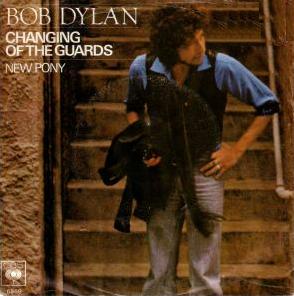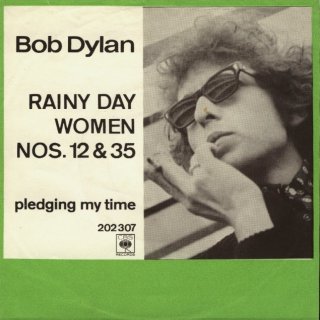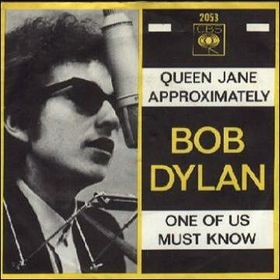Related Research Articles

Highway 61 Revisited is the sixth studio album by the American singer-songwriter Bob Dylan, released on August 30, 1965, by Columbia Records. Dylan continued the musical approach of his previous album Bringing It All Back Home (1965), using rock musicians as his backing band on every track of the album in a further departure from his primarily acoustic folk sound, except for the closing track, the 11-minute ballad "Desolation Row". Critics have focused on the innovative way Dylan combined driving, blues-based music with the subtlety of poetry to create songs that captured the political and cultural climate of contemporary America. Author Michael Gray argued that, in an important sense, the 1960s "started" with this album.

Blonde on Blonde is the seventh studio album by the American singer-songwriter Bob Dylan, released as a double album on June 20, 1966, by Columbia Records. Recording sessions began in New York in October 1965 with numerous backing musicians, including members of Dylan's live backing band, the Hawks. Though sessions continued until January 1966, they yielded only one track that made it onto the final album—"One of Us Must Know ". At producer Bob Johnston's suggestion, Dylan, keyboardist Al Kooper, and guitarist Robbie Robertson moved to the CBS studios in Nashville, Tennessee. These sessions, augmented by some of Nashville's top session musicians, were more fruitful, and in February and March all the remaining songs for the album were recorded.

Time Out of Mind is the thirtieth studio album by American singer-songwriter Bob Dylan, released on September 30, 1997, through Columbia Records. It was released as a single CD as well as a double studio album on vinyl, his first since The Basement Tapes in 1975.

"Like a Rolling Stone" is a song by the American singer-songwriter Bob Dylan, released on July 20, 1965, by Columbia Records. Its confrontational lyrics originated in an extended piece of verse Dylan wrote in June 1965, when he returned exhausted from a grueling tour of England. Dylan distilled this draft into four verses and a chorus. "Like a Rolling Stone" was recorded a few weeks later as part of the sessions for the forthcoming album Highway 61 Revisited.
"Absolutely Sweet Marie" is a song by American singer-songwriter Bob Dylan, which was released on the third side of the double album and Dylan's seventh studio album, Blonde on Blonde (1966). The song was written by Dylan and produced by Bob Johnston. It was recorded at around 1:00 am on March 8, 1966, at Columbia Studio A, Nashville. Some commentators have interpreted the song as being about sexual frustration.
"Angelina" is a song by American singer-songwriter Bob Dylan, recorded on March 26, 1981, for his album Shot of Love but not included on the record. The song was written by Dylan and produced by Jimmy Iovine. A version was released on The Bootleg Series Volumes 1-3 1961-1991 on March 26, 1991, exactly ten years later. A different take was issued on The Bootleg Series Vol. 16: Springtime in New York 1980–1985 in 2021. Critics have expressed their lack of understanding of the lyrics, whilst generally affording the song a positive reception. Dylan's rhyming of the name in the title of the song with "concertina", "hyena", "subpoena", "Argentina" and "arena" has attracted commentary, with scholar Nicholas Birns calling the rhymes "bravura and ... provocative".
"Tombstone Blues" is a song by American singer-songwriter Bob Dylan, which was released as the second track on his sixth studio album Highway 61 Revisited (1965). The song was written by Dylan, and produced by Bob Johnston. Critical interpretations of the song have suggested that the song references the Vietnam War and US President Lyndon Baines Johnson.

"Just Like Tom Thumb's Blues" is a song written and performed by Bob Dylan. It was originally recorded on August 2, 1965, and released on the album Highway 61 Revisited. The song was later released on the compilation album Bob Dylan's Greatest Hits Vol. II and as two separate live versions recorded at concerts in 1966: the first of which appeared on the B-side of Dylan's "I Want You" single, with the second being released on The Bootleg Series Vol. 4: Bob Dylan Live 1966, The "Royal Albert Hall" Concert. The song has been covered by many artists, including Gordon Lightfoot, Cat Power, Nina Simone, Barry McGuire, Judy Collins, Frankie Miller, Linda Ronstadt, the Grateful Dead, Neil Young, The Black Crowes, Townes Van Zandt, Bryan Ferry, and The Handsome Family. Lightfoot's version was recorded only weeks after Dylan's original had been released and reached #3 on the Canadian RPM singles chart.
"Ballad of Hollis Brown" is a folk song written by Bob Dylan, released in 1964 on his third album The Times They Are A-Changin'. The song tells the story of a South Dakota farmer who, overwhelmed by the desperation of poverty, kills his wife, children and then himself.

"Changing of the Guards" is a song written by Bob Dylan, released in 1978 as a single and as the first track on his album Street-Legal. As a single it failed to reach the Billboard Top 100. However, the song has been included on compilation albums: Bob Dylan's Greatest Hits Volume 3, released in 1994, and the Deluxe Edition of Dylan, released in 2007.

"Stuck Inside of Mobile with the Memphis Blues Again" is a song by American singer-songwriter Bob Dylan from his seventh studio album, Blonde on Blonde (1966). The song was written by Dylan and produced by Bob Johnston. It has nine verses, each featuring a distinct set of characters and circumstances. All 20 takes of "Stuck Inside of Mobile with the Memphis Blues Again" were recorded in the early hours of February 17, 1966, at Columbia Records's A Studio in Nashville, Tennessee, with the last take selected for the album. This version also appears on Dylan's second compilation album, Bob Dylan's Greatest Hits Vol. II (1971).

"Pledging My Time" is a blues song by American singer-songwriter Bob Dylan from his seventh studio album, Blonde on Blonde (1966). The song, written by Dylan and produced by Bob Johnston, was recorded on March 8, 1966 in Nashville, Tennessee. Dylan is featured on lead vocals, harmonica, and guitar, backed by guitarist Robbie Robertson and an ensemble of veteran Nashville session men.

"One of Us Must Know (Sooner or Later)" is a song by American singer-songwriter Bob Dylan, which was released as a single on February 14, 1966, and as the fourth track on his seventh studio album Blonde on Blonde in June of that year. The song was written by Dylan and produced by Bob Johnston. It is the narrator's account of a burned-out relationship. It was recorded at Columbia studio A in New York on January 25, 1966, with Dylan and other musicians developing the song through over twenty takes during the session.

"Obviously 5 Believers" is a song by American singer-songwriter Bob Dylan, which was released as the last track of side three of his double album Blonde on Blonde (1966), and was the B-side to the single release of "Just Like a Woman" for releases in America and some other countries. The song was written by Dylan and produced by Bob Johnston. It was recorded at Columbia Music Row Studios, in the early morning hours of a March 9–10, 1966 session. Four takes were recorded, although the first two were incomplete. It has been interpreted as a blues song about loneliness, with critics noting similarities in melody and structure to Memphis Minnie's "Chauffeur Blues". Dylan's vocals and the musicianship of the band on the track have both received critical acclaim, although the track has been regarded as insubstantial by some commentators.
"Temporary Like Achilles" is a song by American singer-songwriter Bob Dylan that was released on side three of his double album, Blonde on Blonde (1966). The song was written by Dylan, and produced by Bob Johnston. It was recorded at Columbia Studio A, Nashville, Tennessee on March 9, 1966. The song is a blues number that incorporates elements of Dylan's incomplete "Medicine Sunday", which he had recorded with members of the Band in New York in October 1965. The song describes a narrator's frustration at being kept waiting by a woman that he wishes to be romantically involved with, who is guarded by "Achilles". Some critics have suggested that the song references the Iliad.
"I Shall Be Free" is a song by American singer-songwriter Bob Dylan. It was recorded on 6 December 1962 at Studio A, Columbia Recording Studios, New York, produced by John Hammond. The song was released as the closing track on The Freewheelin' Bob Dylan on 27 May 1963, and has been viewed as a comedic counterpoint to the album's more serious material. Dylan has never performed the song in concert.
"Down the Highway" is a song by American singer-songwriter Bob Dylan. It was recorded on July 9, 1962 at Studio A, Columbia Recording Studios, New York, produced by John Hammond. The song was released on The Freewheelin' Bob Dylan on May 27, 1963. It is a twelve-bar blues love song, which Dylan told his girlfriend Suze Rotolo he had written about her.
"Dear Landlord" is a song by American singer-songwriter Bob Dylan. It was recorded on November 29, 1967, at Columbia Recording Studios, Nashville, produced by Bob Johnston. The song was released on Dylan's album John Wesley Harding on December 27, 1967. It is a piano blues that has been interpreted as an address to his then-manager Albert Grossman.
"Highway 51 Blues" was the title of a song composed by American blues pianist Curtis Jones, released on a 78 record on January 12, 1938, which was popular enough to spawn several covers and offshoots, including "New Highway 51," recorded in 1940 by the Mississippi guitarist and singer Tommy McClennan. Bob Dylan's track "Highway 51", released as the closing track of the first side of his debut album Bob Dylan on March 19, 1962, was based on McLennan's recording.
"I Shall Be Free No. 10" is a song by American singer-songwriter Bob Dylan, which was released as the fifth track on his fourth studio album Another Side of Bob Dylan (1964). The song was written by Dylan and produced by Tom Wilson. The song is a humorous talking blues, indebted to earlier songs including Lead Belly's "We Shall Be Free". Dylan opens the song by proclaiming that he is normal and average, but then acknowledges his reputation by singing the self-aware doggerel "Yippee! I'm a poet, and I know it/ Hope I don't blow it".
References
- ↑ Oliver Trager. Keys to the Rain: The Definitive Bob Dylan Encyclopedia. New York: Billboard Books, 2004, ISBN 978-0-8230-7974-2.
- ↑ Michael Gray. Song & Dance Man III: The Art of Bob Dylan. New York: Continuum, 2000, ISBN 978-0-304-70762-1.